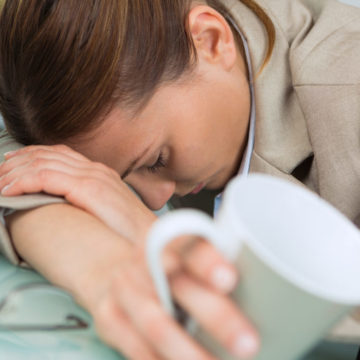
-
- Though tiredness is experienced by everyone at one point, it can be relieved by sleep and rest.
- However, there are other situations or medical conditions that you may unknowingly have that can leave you feeling lethargic, sleepy, or drained.
- Poor sleep habits and diet not only impact overall health but also cause fatigue and reduced concentration.
1. Not Getting Enough Sleep

Sleep deprivation leads to lower concentration and poorer health. Adults should aim for seven to eight hours of sleep every night. Follow a regular schedule and ban electronic gadgets such as cell phones, laptops, and tv from your bedroom.
Still tired? See your doctor, you may have a sleep disorder.
2. Sleep Apnea

This is a condition where your throat narrows during sleep and repeatedly interrupts your breathing. Each interruption means you wake up often in the night and feel exhausted the next day.
To check if you have this condition, your doctor may require a sleep study. In the meantime, lose weight if you’re overweight, stop smoking, and use a CPAP machine to help you sleep easier.
3. Not eating enough calories

You’re likely to feel tired most of the time when you eat too little. And eating the wrong foods can adversely affect your health as well. Maintaining a balanced diet keeps blood sugar levels healthy and prevents us from feeling lethargic when blood sugar drops.
Don’t skip breakfast. Try to eat protein and complex carbs in every meal. Also eat small, frequent meals to give you energy throughout the day.
4. Iron deficiency Anemia

Women with heavy periods are especially prone to iron deficiency. Without adequate iron, the body can’t produce enough red blood cells to transport oxygen to the tissues and organs, leaving you tired and short of breath.
Increase iron levels by taking iron supplements and including iron-rich foods like lean meat, shellfish, beans, and enriched cereal, in your diet.
5. Depression

Besides making you sad, depression also makes you feel drained of energy, gives headaches, disrupts sleep, and reduces appetite. If this happens for more than a few weeks, seek medical help. Talk therapy and/or medications can help.
6. Underactive thyroid

Hypothyroidism means you have little thyroid hormone in your body, causing slower metabolism. You are likely to gain weight and have low energy levels. Synthetic hormones are typically prescribed to speed up metabolism.
7. Too Much Caffeine

Moderate doses of caffeine can boost alertness and concentration, but excessive intake can elevate heart rate and blood pressure, cause restlessness, and in some cases, fatigue. To prevent caffeine withdrawal and additional fatigue, slowly cut back on caffeine-filled beverages and even some medications.
8. Diabetes

Among the key symptoms of diabetes is feeling very tired. See your GP to check for diabetes if you continue to experience persistent and unexplained fatigue. Treatments may include changes in diet, regular exercise, insulin therapy, and medications to process sugar.
9. Dehydration

Fatigue is a common sign of dehydration. And if you’re feeling dizzy and especially thirsty, you’re already dehydrated.
Stay hydrated for your body to feel energized and function optimally. Drink water throughout the day. Sip at least 2 cups an hour or more prior to a physical activity or workout, during, and afterwards.
10. Heart Disease

If you notice it’s becoming increasingly difficult to do daily activities or chores that were once easy, it can be that your heart can no longer do the job. Speak to your doctor about heart disease. You can also manage your symptoms and boost energy through lifestyle changes, medications, and therapy.
11. Chronic Fatigue Syndrome (CFS)

You may have CFS or fibromyalgia if fatigue goes on for more than six months. Although both have many other symptoms, prolonged and unexplained tiredness is a primary sign.
There is no cure for CFS or fibromyalgia. But changing daily schedules, better sleep habits, and starting a moderate exercise regimen can prevent it.
Mild Fatigue

Mild fatigue not associated with any medical condition can be lessened through regular exercise. Research suggests that healthy but tired adults who did a 20-minute stationary bike ride three times a week saw their energy levels greatly increased.
Source: WebMD
